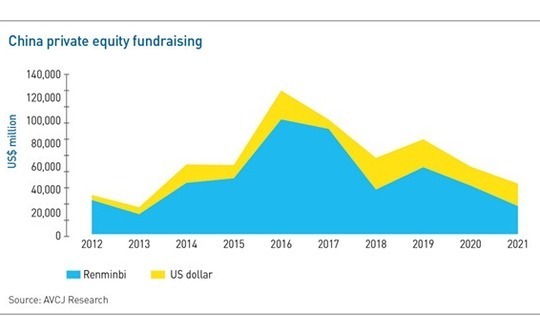
2022 preview: China fundraising

Investors held fire on commitments to China managers amid uncertainty over regulatory reforms. Industry participants hope the government will provide clarity, but the fear LPs won’t hurry back
China-focused GPs have raised more than $19 billion for US dollar-denominated funds so far this year, comfortably beating the 2020 total. However, nearly three-quarters of commitments were made before July, when newly listed Didi was investigated by regulators, culminating in Beijing making it harder for many technology companies to IPO overseas.
Following a string of other regulatory interventions, it was enough to make LPs hold fire. Numerous private equity and venture capital firms have seen fundraising processes slow or planned closes delayed as a result. Industry participants are not confident of a return to form in 2022.
"I think in the next six months, fundraising for China-focused GPs is going to be very, very difficult. We are advising managers to wait until summer or the second half of next year to launch funds, if that's possible," says Niklas Amundsson, partner at placement agent Monument Group.
LPs are responding in different ways, based on their funding structures, governance regimes, risk appetites, and familiarity with China. As a Beijing-based partner at Adams Street Partners, a fund-of-funds, Doris Guo is unruffled by developments.
"At Adams Street, we have seen over 10 waves of regulatory changes during our 15 years in China," she says. "We believe the intent behind these changes is not dissimilar to what we have witnessed in developed markets. Some changes do cause unintended consequences, but we feel the Chinese government is pragmatic and would finetune policies based on situations."

"Having said that, it will take some time for LPs to digest this information and regain confidence," Guo adds, suggesting that LP commitments to China managers may fall, but this would have the helpful side-effect of reducing valuations.
Everyone is waiting for clarity. According to Richard Liu, a founding partner at 5Y Capital, which closed its sixth US dollar China fund in April on $1.7 billion, there are multiple interpretations of the new regulations, which cover everything from data privacy to the use of algorithms. However, regardless of how much certainty is provided, he believes sentiment will rebound.
Indeed, the long-term commitment of LPs to China isn't really being questioned. Rather, they are pausing for 6-12 months to regroup and review.
"A lot of LPs have invested heavily in China over the last couple of years through this summer," Amundsson says. "They are relatively over-allocated to the country, and to venture capital in particular. Now they are taking a breather, but that doesn't necessarily mean they will miss out."
There are, inevitably, exceptions to the rule. Lightspeed China Partners launched its fifth US dollar fund in July and took three months to reach a close of $920 million, beating the $750 million target. James Mi, the firm's founding partner, tells AVCJ that several new LPs came into the fund, including sovereign wealth funds, endowments, and pension funds.
He believes that Lightspeed's focus on deep tech, which is benefiting from policy tailwinds, may have given the fundraise momentum. However, he expresses concern about the prospects for second and third-tier GPs coming to market. When conditions are favorable, LPs are willing to consider emerging managers; when conditions are challenging, they gravitate towards established names.
Moreover, the consumer-focused strategies that worked well in the past have become a much harder sell. Many GPs have repositioned themselves to target enterprise-facing start-ups. LPs, for their part, are said to be interested in biotech, the digitalization of traditional industries, artificial intelligence, robotics, and electric vehicles.
Amundsson adds that a generalist strategy might be equally hard to market. "LPs that have been investing in China for a long time have well-established portfolios. If they are going to add a new relationship in China, it has to be something different. That probably means that you must be highly focused on certain sectors, or you have some sort of an operational value add."
Track record is another key consideration and 2022 could prove challenging for managers reliant on the IPO markets. Guo of Adams Street expects Hong Kong and the mainland bourses to replace the US as the listing location of choice, but there is no immediate fix. While Hong Kong has absorbed numerous large Chinese technology companies, liquidity levels still trail New York.
"There will be few IPOs in US, given US regulators have tightened IPO criteria for Chinese companies and the Chinese government has introduced cybersecurity reviews for companies that hold sensitive data. However, investor sentiment in Hong Kong is currently bearish," says Guo.
"We do notice some interesting developments in the A-share market, but it's still early. For example, the Beijing Stock Exchange could serve as market for smaller companies, while it was announced at the CEWC that the registration-based listing system – currently a three-year-old pilot project – would be fully implemented."
Latest News
Asian GPs slow implementation of ESG policies - survey
Asia-based private equity firms are assigning more dedicated resources to environment, social, and governance (ESG) programmes, but policy changes have slowed in the past 12 months, in part due to concerns raised internally and by LPs, according to a...
Singapore fintech start-up LXA gets $10m seed round
New Enterprise Associates (NEA) has led a USD 10m seed round for Singapore’s LXA, a financial technology start-up launched by a former Asia senior executive at The Blackstone Group.
India's InCred announces $60m round, claims unicorn status
Indian non-bank lender InCred Financial Services said it has received INR 5bn (USD 60m) at a valuation of at least USD 1bn from unnamed investors including “a global private equity fund.”
Insight leads $50m round for Australia's Roller
Insight Partners has led a USD 50m round for Australia’s Roller, a venue management software provider specializing in family fun parks.








